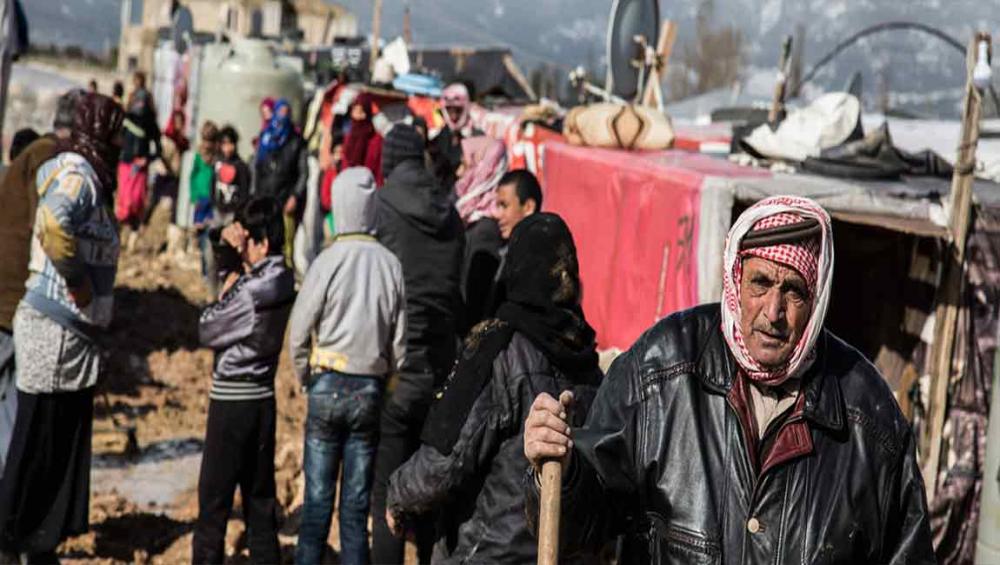Just Earth News | @JustEarthNews | 24 Feb 2018

UNICEF/UN0158355/Halldorsson
New York, Feb 24 (JEN): Senior United Nations officials on Friday called for greater support for Syrian refugees as well as the communities hosting them amid escalating violence in the war-torn country.
“We are deeply shaken and distraught by the brutality and utter disregard for civilian lives we are witnessing in Eastern Ghouta and other parts of Syria today,” said UN High Commissioner for Refugees Filippo Grandi, UN Development Programme Administrator Achim Steiner and Emergency Relief Coordinator Mark Lowcock in a joint press release.
“We are urging an immediate ceasefire, protection of civilians and civilian infrastructure and unfettered humanitarian access to Eastern Ghouta, swift evacuation of sick and injured people and safe passage for civilians wishing to leave,” they said.
“Now more than ever, it is critical to sustain and reinforce international support to the neighbouring countries and communities hosting some 5.5 million Syrian refugees in Turkey, Lebanon, Jordan, Iraq and Egypt. They continue to provide a profound service to humanity at a time when inside Syria, inhumanity seems to be prevailing,” they added.
According to the UN, nearly seven years of relentless violence in Syria has displaced half of Syria’s population, including 6.1 million internally displaced, and 5.5 million Syrians living as refugees in the region.
Despite the generosity of the neighbouring countries, most Syrian refugee families – and many in their host communities – fall below the poverty line and struggle to meet basic needs, the release said.
In December last year, UN agencies and some 270 non-governmental organizations released the 2018 Regional Refugee and Resilience Plan seeking $4.4 billion to support Syrian refugees and host communities in neighbouring countries.
The Plan aims to provide protection for refugee populations, education, health, food security, livelihoods, and water and sanitation services to vulnerable groups.
The UN Security Council is considering adopting a resolution that would establish a 30-day ceasefire across Syria.
UN migration agency seeks $194 million in funding to help Syrians
Meanwhile, the International Organization for Migration (IOM) on Friday launched an appeal for $194 million to help displaced Syrians living in and outside their war-torn country as well as the communities hosting them.
Seven years into the armed conflict in Syria, the humanitarian situation continues to deteriorate. Over 13 million people are still in need of humanitarian assistance inside the country, with nearly 3 million people living in hard-to-reach or besieged areas.
With its 2018 appeal, the UN migration agency seeks to assist:
1 million people with non-food items and shelter support
800,000 people with access to safe water and services
500,000 people with health services
500,000 people with community-led protection services
200,000 people with livelihood opportunities
135,000 displaced people to receive adequate services in camps
35,000 children to attend school
“These interventions are vital to ensuring that Syrians get the life-saving assistance and livelihood support that many desperately need,” said IOM Director General William Lacy Swing, from the Organization’s headquarters in Geneva.
Since the crisis began, economic growth within host countries has been severely affected. With high unemployment rates, especially among young people, and limited resource availability, it is challenging for governments and municipalities to provide basic services.
IOM tracked 850,000 internally displaced persons returning to their areas of origin during 2017. During the same period, however, 2.9 million people continued to flee their homes, illustrating the continuing adverse effect of violence and conflict on the Syrian population.
Access to primary health care has been drastically reduced inside Syria, while agricultural production has been cut in half compared to 2011 levels.
In 2017, IOM organized the transportation of over 37,000 Syrian refugees from Lebanon, Turkey, Jordan, Iraq and Egypt to 23 countries including Canada, Germany, the United Kingdom, France, Sweden, Norway, the United States and the Netherlands, among others.